Part of a collection of photos, all dated 1890. They were taken in East London during that year, but the photographer was unknown and not credited.
(Some of the photos can be further enlarged by clicking on them.)
Factory girls outside a cafe during their meal break. They wore thick white aprons to protect what were likely to be the only clothes they owned.
Barefoot boys photographed in midwinter.
Old women selling used clothing and material in Chrisp Street Market.
The girl on the right has lost one of her only pair of boots, so is walking around wearing just one. The soiled aprons under their coats suggest that they were both employed in a factory. Child labour was still common then.
A makeshift baby carriage with no wheels. It was just dragged around.
This boy was described as an ‘Incorrigible Beggar’.
Rag and bone collectors announcing their intention to buy those items by blowing a bugle. The children in the background were excited to be included in the photo.
Members of an East London Boy’s Brigade band. Being able to wear a smart uniform and be a part of such an organisation was a temporary relief from their hard lives.
Local people posing on Dorset Street, in Spitalfields. This was known as one of the most lawless streets in London, and was frequented by pimps and prostitutes. It was also one of the favourite haunts of Jack The Ripper. He murdered Mary Kelly in Millers Court, just off Dorset Street. And one of his other victims, Annie Chapman, lived in a cheap lodging house on Dorset Street before he killed her in nearby Hanbury Street.
Curious children crowding around the photographer. Despite their poverty and living conditions, they were mostly well-dressed.
A street sharpener. He would walk around hoping to be paid to sharpen knives and scissors. Even when I was a child in the 1950s, men like him were still seen everywhere. Working people could not afford to replace blunt knives or scissors, so it was economical to have them sharpened regularly.
This man is what passed for ‘Pest Control’, in 1890. He carried a placard announcing his services, and at a time when bedbugs, rats, cockroaches, and other pests were abundant, he would be in high demand.




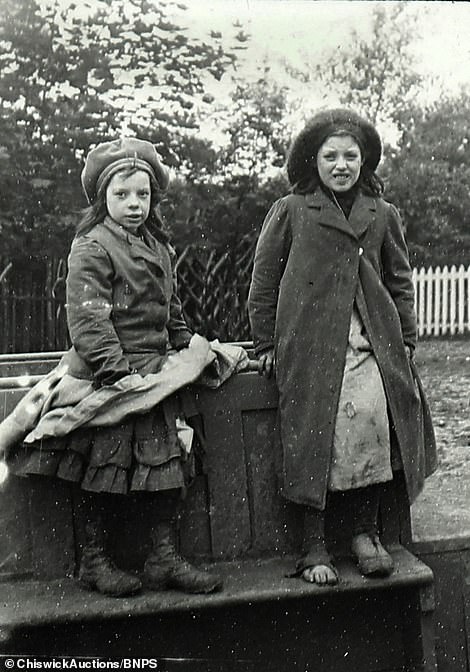

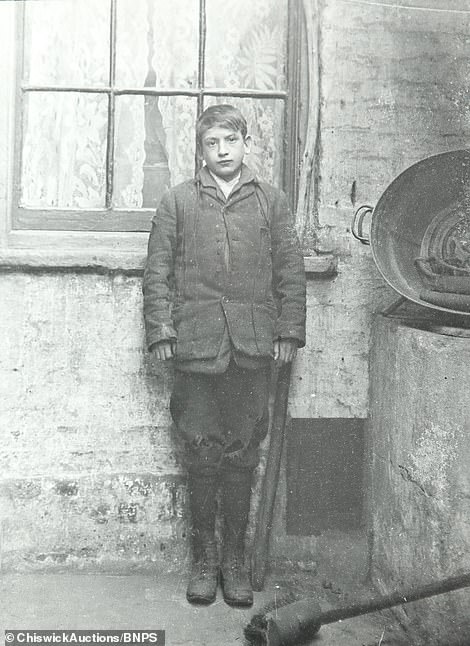
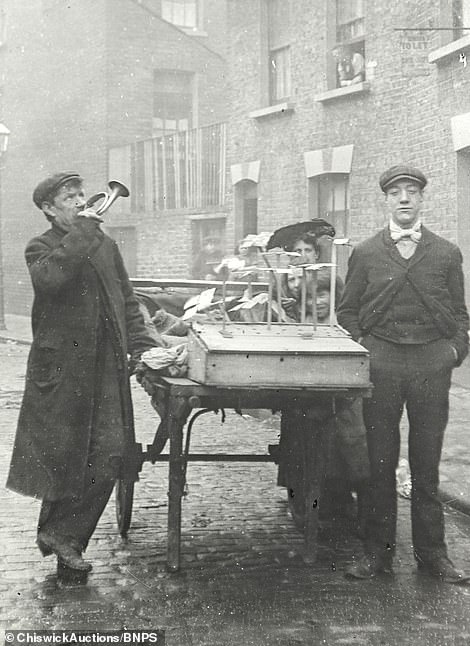


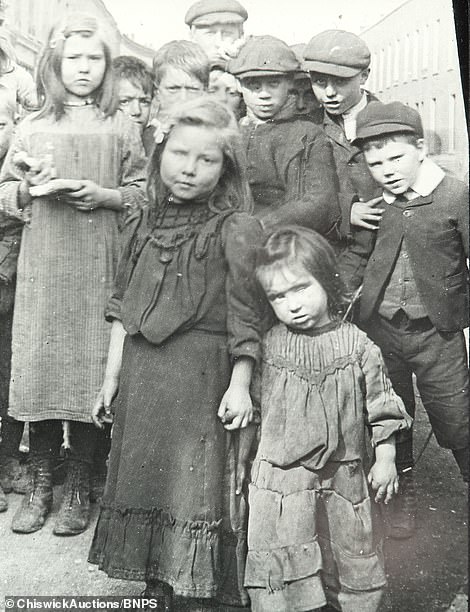
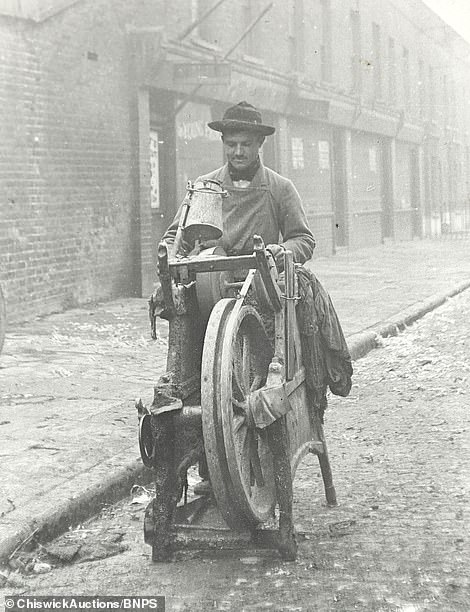

Very sad, especially the child with only one boot.
LikeLiked by 1 person
They just got on with it, and accepted their hard lives. It wasn’t fair of course.
Best wishes, Pete.
LikeLiked by 1 person
My mother always said the same thing. Life was tough, and ‘moving on’ was the way. Best to you, Pete.
LikeLiked by 1 person
These pictures never fail to humble me.
LikeLiked by 1 person
They make me grateful to be born when I was, Michele.
Best wishes, Pete. x
LikeLiked by 1 person
Pete you and I did not grow up in a perfect world-no one does, bit what a golden time it was cmpared to the hardships of yesteryears-and the crazy of these modern times. Like you, I am so thankful for what we had. I worry for my very young grandchildren. I am tryng to get caught up on blogging. I have purchased another very old house and trying to do as much work as I can-nothing involving a tool, but I am as busy as any bee ever dared to be. Thank you for tolerating my neglect-You know I read every post, but can hardly say how much I enjoy your blog. x Michele
LikeLiked by 1 person
I am always delighted to see you when you have time to comment here, Michele. I know you are busy, so there is never any need to apologise.
Best wishes, Pete. x
LikeLiked by 1 person
A very sobering look at history.
LikeLiked by 1 person
It makes me grateful to have been born 60 years later, Peggy.
Best wishes, Pete.
LikeLiked by 1 person
(1) Those factory girls are smoking hot joints.
(2) But do those boys run barefoot in the park?
(3) “Those old women are Chrispy critters.” (Hannibal Lecter)
(4) The factory gave that girl the boot. It should have given her another one!
(5) “I’ll get some wheels for this old crate one of these days, sugar, I promise!”
(6) If you didn’t give the ‘Incorrigible Beggar’ some money, he’d go after you with a broom. Whack!
(7) The Andrews Sisters came running when they heard the bugle boy.
(8) The East London Boy’s Brigade got in a big fight with the West London Boy’s Brigade, but it was broken up by the South London Boy’s Brigade with the help of the North London Boy’s Brigade.
(9) I’ve never forgiven Jack The Ripper for murdering Mary Kelly in Millers Court. She was my favorite lollipop girl.
(10) Children of the Corn are usually curious. “Shall we murder the photographer? He looks like a carnivore to me.”
(11) Overheard:
Street Sharpener: “Back again, sir?”
Jack the Ripper: “Yes! I really appreciate your service!”
(12) “I hate to bug you, old man, but you misspelled cockroaches.”
LikeLiked by 1 person
Nice Ripper/knife sharpener connection, David. 🙂
Best wishes, Pete.
LikeLiked by 1 person
To see the children on these photos from the past always touches my heart. What resources one had lost with these children in poverty. xx Michael
LikeLiked by 1 person
I am sure many of those children did not live to an old age, Michael. Health care was almost non-existent.
Best wishes, Pete.
LikeLiked by 1 person
What a great shame, and the same also is going on in Africa and otherwhere, since centuries. ;-( xx Michael
LikeLiked by 1 person
Reblogged this on NEW BLOG HERE >> https:/BOOKS.ESLARN-NET.DE.
LikeLiked by 1 person
Interesting photos. Such desperate poverty; I feel sorry for all the people in these photos. Their lives must’ve been miserable. If they could see how we live today they’d be astounded at the cleanliness and technology.
LikeLiked by 1 person
They certainly would. Even the poorest people in London today would seem rich by comparison.
Best wishes, Pete.
LikeLiked by 1 person
Fascinating social history. Thank you for sharing. Warmest regards, Ed
LikeLiked by 1 person
Glad you enjoyed the photos.
Best wishes, Pete.
LikeLiked by 1 person
These could have been taken on the Lower East Side of New York City at the same time. I was startled at how similar they looked to those.
LikeLiked by 1 person
Yes, poverty in the working classes and slum living conditions were much the same in all western countries at the time.
Best wishes, Pete.
LikeLiked by 1 person
Speaking of hard lives . . . The child factory workers are particuarly affecting.
LikeLiked by 1 person
They are indeed, Liz. After the Factories Act of 1833, children under the age of 9 were legally prohibited from working. However, most companies took a blind eye to that law, and it was rarely enforced. Even in 1890, children were working in factories, mills, and coal mines from the age of 6, and girls like the ones in the photo were considered to be adults who had to earn their keep in the poor families they came from.
As late as 1938, my mum had to leave school at the age of 14, and work full-time, having taken no exams or qualifications. She trained as a book-keeper for a company on London’s Docks, so she was considered to be ‘lucky’.
Best wishes, Pete.
LikeLiked by 1 person
Child labor reform in the US didn’t finally take hold under after the Great Depression.
LikeLiked by 1 person
I remember the man who sharpened knives and the rag and bone man. I enjoy seeing these old photos though it’s always stunning to see how tough life was. I look at their faces and wonder what sort of things they chatted about, what made them happy. I suppose just having a meal and a warm place to sleep, but I wonder if they hoped things would improve.
LikeLiked by 1 person
From reading contemporary accounts, it seems to me that most poor people accepted their fate. If they could scrape the money together, some emigrated to Canada and Australia in the hope of a better life. But for the majority of hard-working Londoners, it was just a case of work until you die.
Best wishes, Pete.
LikeLike
Excellent photos.
LikeLiked by 1 person
Glad to hear you enjoyed them, Molly.
Best wishes, Pete.
LikeLiked by 1 person
Wow! Incredible photos capturing a unique time in the world’s history.
LikeLiked by 2 people
I think these are really good ones, John.
Best wishes, Pete.
LikeLiked by 1 person
What pictures!!!
LikeLiked by 1 person
Yes indeed. Thanks, Don.
Best wishes, Pete.
LikeLike
I blame everyone in hats on lack of commercially available shampoo.
LikeLiked by 1 person
They were cold back then. The hats kept them warm. 🙂
Best wishes, Pete.
LikeLiked by 1 person
How wonderful that photography has documented these times.
LikeLiked by 1 person
A truly wonderful invention, Darlene.
Best wishes, Pete.
LikeLiked by 1 person
The images are quite fascinating, and I really love the exterminator’s sign!
LikeLiked by 1 person
He tried to cover all possible bugs and vermin on his sign, Dorothy.
Glad you enjoyed the photos.
Best wishes, Pete.
LikeLiked by 1 person
Barefoot in winter !
Very expressive photos. Thank you for sharing.
LikeLiked by 1 person
Their parents were too poor to be able to buy them shoes. They were hard times indeed.
Best wishes, Pete.
LikeLike
Yes here too it is the same. But in south India there is no winter. There is a lot of poverty here and it is difficult to imagine the lives of people living in slums. Regards, Lakshmi
LikeLiked by 1 person
Another great compilation….thanx Pete chuq
LikeLiked by 1 person
I like these old photos a lot. The curiosity in the faces of people not used to seeing cameras shows how much has changed since.
Best wishes, Pete.
LikeLiked by 1 person
Remembering the books I read set in the 19th century.
LikeLiked by 1 person
Yes, they often told how hard life was for so many people back then, Arlene.
Best wishes, Pete.
LikeLike
Great images…I remember the rag and bone man and the man who sharpened ..Tweeted , Pete x
LikeLiked by 1 person
Thanks, Carol. There were still rag and bone men using a horse and cart around Camden before I moved away in 2012. But they were looking for scrap metal and old furniture by then.
Best wishes, Pete. x
LikeLiked by 1 person
Oh blimey I thought they would be long gone then…x
LikeLiked by 1 person
the barefoot boys in winter is heartbreaking
LikeLiked by 1 person
So much social inequality during the Victorian era. People just seemed to accept their fate.
Best wishes, Pete.
LikeLiked by 1 person
I love these old photos. I have many happy memories of Chrisp Street market on a Saturday morning. Mum would send me for fruit and veg and I’d spend my time browsing through the second hand records on a stall in the market and come back with records and no fruit and veg, so I’d have to go back again…
LikeLiked by 1 person
Weekend markets were such a feature of my teenage years. I missed them when we moved to the suburbs.
Best wishes, Pete.
LikeLiked by 1 person
Yes, I miss them too. I loved Roman Road market as well.
LikeLiked by 1 person
Like compulsory viewing like for Gen Z like in my view like . . .
LikeLiked by 1 person
Do they even care about it though, Gavin?
Best wishes, Pete.
LikeLike